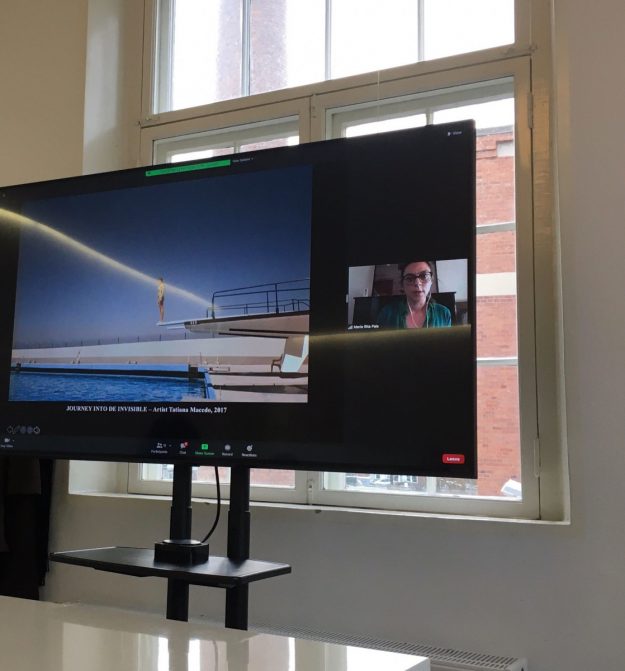Text and Photo: Katarina Larsen, researcher
 The workshop included presentations with experiences from Portugal and Sweden on nature-based solutions and green buffer zones in response to climate changes and risks of flooding.
The workshop included presentations with experiences from Portugal and Sweden on nature-based solutions and green buffer zones in response to climate changes and risks of flooding.
The workshop participants were invited to join a digital trip along the Portuguese coast with Maria Rita Pais (Universidade Lusófona, Portugal) visiting historical sites of bunker defense, now providing a green area stretching along the coast. Lina Suleiman (KTH) presented experiences from nature-based solutions in Årsta as a strategy for moderating the impacts of climate change in Stockholm. The workshop participants also discussed climate change and the arts, urban climate challenges , “seeking solutions for whom”, flexibility and diversity in urban climate solutions. See workshop introduction below.
Workshop introduction
Climate challenges and the arts: urban time scales, inclusion and future flexibility
Urban strategies for managing storm water and crafting robust solutions to cope with future climate challenges are receiving renewed attention with events of heavy rainfall and costly effects from flooding we have seen in Sweden and internationally in the past years.
With this workshop, we look into some of these challenges and also discuss dilemmas with some proposed solutions. These solutions are themselves raising new questions about how to communicate alternative solutions and “solutions for whom” (how can solutions be communicated to citizens, experts, and policymakers?), time scales (what are the time perspective we apply for climate robust solutions in renewal of cities?), inclusion/diversity (how can a diverse set of voices be heard when crafting new solutions?) and flexibility (how can we build solutions that are flexible enough to create room for maneuver needed in the future?) for urban areas when facing new – and sometimes – unexpected climate challenges.

In this hybrid-workshop, the local Stockholm partners (KTH, Intercult) participated on site from Färgfabriken while colleagues from Portugal, Greece, Italy, Turkey, The Netherlands and Poland attended via link. Presentations by colleagues at KTH included Katarina Larsen, Div. History of Science, Technology and Environment (organizer) and Lina Suleiman, Div. Urban and Regional Studies. The event was co-organized with the art institution Färgfabriken in Stockholm and also included an introduction to the work carried out in collaboration between researchers and artists in the exhibition Symbiosis at Färgfabriken, carried out by the project NATURE.
Plans for 2022 in H2020-initiative SOS Climate Waterfront:
During next year there are some planned exchange activities with Greece (Thessaloniki, January), Italy (Rome, March) and a workshop in end of May/June hosted by KTH in Stockholm.
If you are interested to know more about these activities, contact the organizers Katarina Larsen or Lina Suleiman.
For more info on the H2020 initiative, SOS Climate Waterfront, see
___

